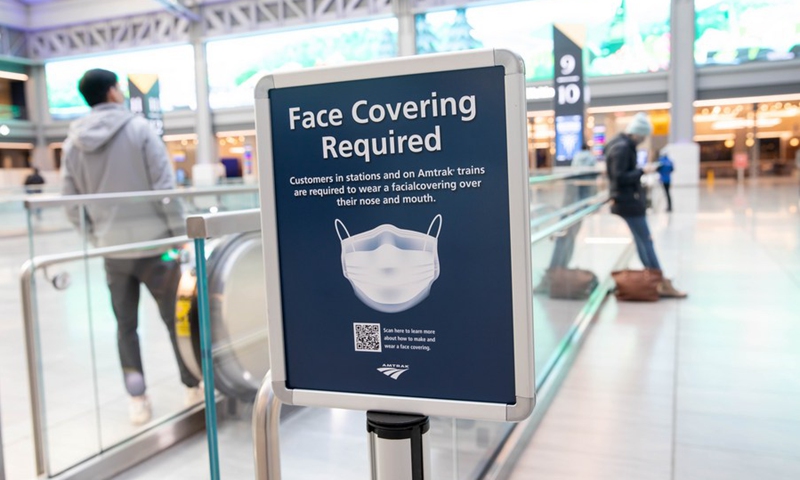
A sign advertising a face mask requirement is displayed at the Moynihan Train Hall in New York, the United States, Jan. 23, 2021. (Photo by Michael Nagle/Xinhua)
An influential COVID-19 model has predicted a possible "spring spike" in coronavirus deaths in the United States if emerging variants rapidly spread and people let down their guard against the virus.
In its latest forecast, the University of Washington's Institute for Health Metrics and Evaluation (IHME) estimates the B.1.351 variant first detected in South Africa and identified in the United States this week could drive the country's COVID-19 death toll up to 654,000 by May 1 in a worst-case scenario if mobility returns to pre-pandemic levels.
A resurgence of the virus could also occur in the spring in California and Florida, according to the forecast.
Keeping mobility low and maintaining social distancing could reduce that number by approximately 30,000, said the forecast.
"What we're seeing is sobering, and will require us to continue taking this pandemic very seriously," said Christopher Murray, director of IHME.
"Getting vaccines out quickly is essential, and masks are still one of the best tools we have to keep transmission low and avoid the worst possible outcome. People will need to continue taking precautions even once they are vaccinated, because of the potential for more contagious variants to spread," he said.
"We have not been seeing governments taking action to apply cautionary measures as quickly as expected, and have incorporated that information into the modeling," said Murray. "Without measures to control the spread of the disease, mobility remains higher and transmission is more likely."
IHME's forecasts predict only 38 percent of people in the United States will be immune by May 1.
In a worst-case scenario, there is also the possibility of a third wave next winter, according to the forecast.
The vaccine rollout in the United States has drawn great public attention since it started on Dec. 14 last year. Health experts and officials have blamed states for slow vaccine rollout.
In face of growing frustration over vaccine shortages, US President Joe Biden announced earlier this week a roughly 16 percent boost in vaccine deliveries to states over the next three weeks.
The country expects to provide enough doses to vaccinate 300 million Americans by the end of the summer or early fall, according to Biden.
About 27.88 million doses have been administered as of Jan. 29, according to the US Centers for Disease Control and Prevention.
